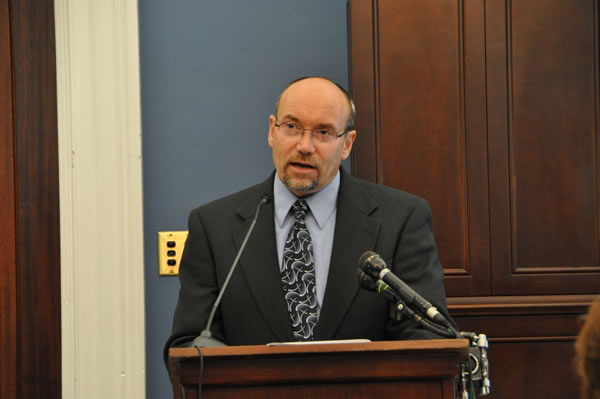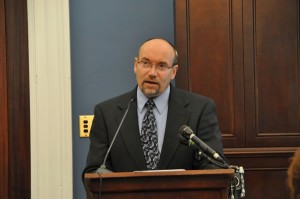National
Adoption bill aims to protect LGBT parents, kids
A tearful moment interrupted a congressional panel discussion on LGBT adoption

A tearful moment interrupted a congressional panel discussion on LGBT adoption Thursday when a gay foster parent described how state officials in Florida were threatening to take away his two children.
Martin Gill of Miami and his partner are seeking to adopt two young brothers — referred to John and James Doe in court papers — for whom they’ve cared for six years. Because a 1977 Florida statute prohibits gays from adopting, Gill has filed a lawsuit against the state in attempt to overturn the law and adopt the two children.
After showing slides of his children decorating a Christmas tree and dressed as Batman for Halloween, Gill recalled how during an intermediary court hearing the state attorney “made it all too clear” that he couldn’t remain the caregiver should the lawsuit fail.
“They answered that if the court allows the ban to stand, the state would immediately get a court order to remove these kids from our home, and they would be made available for adoption,” Gill said.
Holding back tears, Gill said the judge pressed further on whether some other kind of permanent guardianship could be available, but the response from the counsel was, “No, I don’t think it is.”
“To that, there was an audible gasp in the court room,” he said. “I felt my own heart drop.”
The intermediary court considering the case could make its decision public at any time. The American Civil Liberties Union, which has filed the lawsuit, is expecting the case to continue to the Florida Supreme Court.
Knowing that at age 4 the older child had to care for the younger one because they had no parents, Gill said his biggest fear is that the state would send the two children to separate homes.
“The lives of these two young boys would be completely devastated,” he said. “What is ironic under the current law is that how in the state of Florida, they would fulfill the goal of permanency for these two young children by splitting them up.”
To address the situation and others like it, Rep. Pete Stark (D-Calif.) has introduced the Every Child Deserves a Family Act. The bill would restrict federal funds for states — including Florida — if they have laws or practices that discriminate in adoption on the basis of sexual orientation and gender identity.
During the panel discussion intended to highlight the bill, Stark said discrimination shouldn’t take place in states that have statutes prohibiting LGBT people from adopting or where discrimination takes place without guidance from the law.
“Standards in adoption and foster care should only reflect the child’s best interest, nothing else,” Stark said. “Too many children need a loving home and we just should not close any doors.”
On March 8, Stark reintroduced the Every Child Deserves a Family Act after having previously introduced the bill last year. The new legislation makes technical changes and is intended to ensure that children won’t face discrimination on the basis of their own sexual orientation and gender identity as they’re placed into homes.
The original legislation has 14 co-sponsors that are expected to carry to the new legislation, H.R. 4806. Proponents are also working on a Senate companion bill that could be introduced before lawmakers break for recess this month.
Jennifer Chrisler, executive director of the Family Equality Council, said passing the legislation would enable thousands of children in foster care to find families.
Chrisler said a half million children are living in foster care throughout the U.S. and 120,000 of them are available for adoption. But each year, she noted, around 25,000 children “age out” of the system without finding parents.
“And yet, while there is a shortage of qualified foster and adoptive parents for these children in need, some states categorically exclude thousands of prospective parents simply because of their sexual orientation, gender identity or marital status,” she said.
Florida is the only state that has a statute explicitly prohibiting adoption by gays and lesbians. Other states, including Utah and Arkansas, have laws prohibiting unmarried couples from adopting or fostering children.
But Chrisler said the majority of states have no laws to speak to whether LGBT people can adopt, which can leaves children in foster care “vulnerable to the individual biases of agencies, case workers and judges.”
As the Every Child Deserves a Family Act builds support, litigation to rectify the situations in certain states is proceeding. Leslie Cooper, an ACLU senior staff attorney, said in addition to the Florida case, another ACLU lawsuit is pending in Arkansas to overturn the law preventing unmarried cohabitating couples from adopting.
But Cooper said lawsuits aren’t “the way to fully resolve this issue,” noting the cost of cases and the difficulty of litigation in states without specific statutes barring LGBT adoption.
“Litigation can be extremely effective and chip away at this problem, and hopefully in some states, resolve the issue,” she said. “But they aren’t the answer and can’t solve this problem in any stretch. A more global solution like this bill is what we need.”
Two panelists during the discussion presented research showing that the sexual orientation of parents has no impact on their children and many LGBT people would consider adoption if it were available to them.
Charlotte Patterson, a lesbian psychology professor at the University of Virginia who specializes in LGBT families, said 36 percent of lesbians are mothers, 16 percent of gay man are fathers and 40 to 50 percent of gays and lesbians say they would consider becoming parents.
“Children really do well in lesbian and gay parented homes as compared to demographically similar homes parented by heterosexual adults,” she said.
Patterson said growing up in LGBT households has no influence on children’s relationships with their parents, siblings and peers, nor does it affect their gender development, such as whether they want to play with traditionally male or female toys.
“The consensus here is extraordinarily clear,” she said. “Kids are well adjusted. There’s really no need to justify any kind of discrimination.”
Following the discussion, Patterson told DC Agenda studies often touted by social conservatives claiming that biological parents are better than same-sex couples at raising children are misleading.
“In general, what they’re referring to is research about kids growing up with single heterosexual parents and kids growing up with heterosexual couples,” she said. “In those studies, there are usually no openly gay or lesbian people, but the results of the studies are often used to make inferences about what kids in gay and lesbian parented families would do. That’s a mistake, of course.”
Gary Gates, a research fellow at the Williams Institute, a think-tank on sexual orientation at the University of California, Los Angeles, had similar data on the number of gays and lesbians with children and those wanting to adopt.
A common misconception, Gates said, is that it’s mostly LGBT people who are white that want to raise children, as opposed to LGBT people who belong to racial minority groups.
“All the data that we know about parenting by LGBT people and same-sex couples shows that, in fact, child-rearing is much more common in people of color,” he said. “So particularly African-Americans and Latinos and Latinas, they’re twice as likely as their white counterparts to say that they’ve raised a child.”
Regarding the full population, Gates said about one million LGBT people in the United States are raising around two million children.
The numbers are different when looking just at same-sex couples. Based on U.S. census data, Gates said about 112,000 same-sex couples throughout the United States are raising around 250,000 children.
But Gates also said the data show more same-sex couples raise children in states other than where LGBT people tend to live — often West or East Coast states with more gay friendly laws.
“What that also tells you is that same-sex couples are raising kids in states that have some of the most restrictive and challenging legal environments for gay and lesbian people raising children,” Gates said. “Many of the states with relatively high fractions of same-sex couples raising kids are very both politically and socially conservative.”
Also speaking at the panel was Nakea Paige, an 18-year-old high school student in D.C. who grew up in the foster care system. Although she’s bound this fall for Michigan State University to study biochemical engineering, Paige said her childhood was difficult because she never found a permanent home.
“I’ve been in one group home and three foster homes within three years, and having lived in three different places in three years has been a very scary experience,” she said.
Paige said one foster mother wouldn’t allow her to stay because she wasn’t receiving the full amount of compensation she thought she would receive. The foster mother had given a 30-day notice to leave, but Paige said she didn’t know about the notice until it was time for her to go.
Following the panel discussion, Paige told DC Agenda she wouldn’t have minded living with LGBT parents.
“It wouldn’t have bothered me, basically because it’s a family,” she said. “As long as I have somebody there to love me as a child, and them as a parent, then I’m fine with it.”
Federal Government
Lambda Legal praises Biden-Harris administration’s finalized Title IX regulations
New rules to take effect Aug. 1

The Biden-Harris administration’s revised Title IX policy “protects LGBTQ+ students from discrimination and other abuse,” Lambda Legal said in a statement praising the U.S. Department of Education’s issuance of the final rule on Friday.
Slated to take effect on Aug. 1, the new regulations constitute an expansion of the 1972 Title IX civil rights law, which prohibits sex-based discrimination in education programs that receive federal funding.
Pursuant to the U.S. Supreme Court’s ruling in the landmark 2020 Bostock v. Clayton County case, the department’s revised policy clarifies that discrimination on the basis of sexual orientation and gender identity constitutes sex-based discrimination as defined under the law.
“These regulations make it crystal clear that everyone can access schools that are safe, welcoming and that respect their rights,” Education Secretary Miguel Cardona said during a call with reporters on Thursday.
While the new rule does not provide guidance on whether schools must allow transgender students to play on sports teams corresponding with their gender identity to comply with Title IX, the question is addressed in a separate rule proposed by the agency in April.
The administration’s new policy also reverses some Trump-era Title IX rules governing how schools must respond to reports of sexual harassment and sexual assault, which were widely seen as imbalanced in favor of the accused.
Jennifer Klein, the director of the White House Gender Policy Council, said during Thursday’s call that the department sought to strike a balance with respect to these issues, “reaffirming our longstanding commitment to fundamental fairness.”
“We applaud the Biden administration’s action to rescind the legally unsound, cruel, and dangerous sexual harassment and assault rule of the previous administration,” Lambda Legal Nonbinary and Transgender Rights Project Director Sasha Buchert said in the group’s statement on Friday.
“Today’s rule instead appropriately underscores that Title IX’s civil rights protections clearly cover LGBTQ+ students, as well as survivors and pregnant and parenting students across race and gender identity,” she said. “Schools must be places where students can learn and thrive free of harassment, discrimination, and other abuse.”
Michigan
Mich. Democrats spar over LGBTQ-inclusive hate crimes law
Lawmakers disagree on just what kind of statute to pass

Michigan could soon become the latest state to pass an LGBTQ-inclusive hate crime law, but the state’s Democratic lawmakers disagree on just what kind of law they should pass.
Currently, Michigan’s Ethnic Intimidation Act only offers limited protections to victims of crime motivated by their “race, color, religion, gender, or national origin.” Bills proposed by Democratic lawmakers expand the list to include “actual or perceived race, color, religion, gender, sexual orientation, gender identity or expression, ethnicity, physical or mental disability, age, national origin, or association or affiliation with any such individuals.”
Democratic Gov. Gretchen Whitmer and Attorney General Dana Nessel have both advocated for a hate crime law, but house and senate Democrats have each passed different hate crimes packages, and Nessel has blasted both as being too weak.
Under the house proposal that passed last year (House Bill 4474), a first offense would be punishable with a $2,000 fine, up to two years in prison, or both. Penalties double for a second offense, and if a gun or other dangerous weapons is involved, the maximum penalty is six years in prison and a fine of $7,500.
But that proposal stalled when it reached the senate, after far-right news outlets and Fox News reported misinformation that the bill only protected LGBTQ people and would make misgendering a trans person a crime. State Rep. Noah Arbit, the bill’s sponsor, was also made the subject of a recall effort, which ultimately failed.
Arbit submitted a new version of the bill (House Bill 5288) that added sections clarifying that misgendering a person, “intentionally or unintentionally” is not a hate crime, although the latest version (House Bill 5400) of the bill omits this language.
That bill has since stalled in a house committee, in part because the Democrats lost their house majority last November, when two Democratic representatives resigned after being elected mayors. The Democrats regained their house majority last night by winning two special elections.
Meanwhile, the senate passed a different package of hate crime bills sponsored by state Sen. Sylvia Santana (Senate Bill 600) in March that includes much lighter sentences, as well as a clause ensuring that misgendering a person is not a hate crime.
Under the senate bill, if the first offense is only a threat, it would be a misdemeanor punishable by one year in prison and up to $1,000 fine. A subsequent offense or first violent hate crime, including stalking, would be a felony that attracts double the punishment.
Multiple calls and emails from the Washington Blade to both Arbit and Santana requesting comment on the bills for this story went unanswered.
The attorney general’s office sent a statement to the Blade supporting stronger hate crime legislation.
“As a career prosecutor, [Nessel] has seen firsthand how the state’s weak Ethnic Intimidation Act (not updated since the late 1980’s) does not allow for meaningful law enforcement and court intervention before threats become violent and deadly, nor does it consider significant bases for bias. It is our hope that the legislature will pass robust, much-needed updates to this statute,” the statement says.
But Nessel, who has herself been the victim of racially motivated threats, has also blasted all of the bills presented by Democrats as not going far enough.
“Two years is nothing … Why not just give them a parking ticket?” Nessel told Bridge Michigan.
Nessel blames a bizarre alliance far-right and far-left forces that have doomed tougher laws.
“You have this confluence of forces on the far right … this insistence that the First Amendment protects this language, or that the Second Amendment protects the ability to possess firearms under almost any and all circumstances,” Nessel said. “But then you also have the far left that argues basically no one should go to jail or prison for any offense ever.”
The legislature did manage to pass an “institutional desecration” law last year that penalizes hate-motivated vandalism to churches, schools, museums, and community centers, and is LGBTQ-inclusive.
According to data from the U.S. Department of Justice, reported hate crime incidents have been skyrocketing, with attacks motivated by sexual orientation surging by 70 percent from 2020 to 2022, the last year for which data is available.
Twenty-two states, D.C., Puerto Rico, and the U.S. Virgin Islands have passed LGBTQ-inclusive hate crime laws. Another 11 states have hate crime laws that include protections for “sexual orientation” but not “gender identity.”
Michigan Democrats have advanced several key LGBTQ rights priorities since they took unified control of the legislature in 2023. A long-stalled comprehensive anti-discrimination law was passed last year, as did a conversion therapy ban. Last month the legislature updated family law to make surrogacy easier for all couples, including same-sex couples.
A bill to ban the “gay panic” defense has passed the state house and was due for a Senate committee hearing on Wednesday.
Indiana
Drag queen announces run for mayor of Ind. city
Branden Blaettne seeking Fort Wayne’s top office

In a Facebook post Tuesday, a local drag personality announced he was running for the office of mayor once held by the late Fort Wayne Mayor Tom Henry, who died last month just a few months into his fifth term.
Henry was recently diagnosed with late-stage stomach cancer and experienced an emergency that landed him in hospice care. He died shortly after.
WPTA, a local television station, reported that Fort Wayne resident Branden Blaettne, whose drag name is Della Licious, confirmed he filed paperwork to be one of the candidates seeking to finish out the fifth term of the late mayor.
Blaettner, who is a community organizer, told WPTA he doesn’t want to “get Fort Wayne back on track,” but rather keep the momentum started by Henry going while giving a platform to the disenfranchised groups in the community. Blaettner said he doesn’t think his local fame as a drag queen will hold him back.
“It’s easy to have a platform when you wear platform heels,” Blaettner told WPTA. “The status quo has left a lot of people out in the cold — both figuratively and literally,” Blaettner added.

The Indiana Capital Chronicle reported that state Rep. Phil GiaQuinta, who has led the Indiana House Democratic caucus since 2018, has added his name to a growing list of Fort Wayne politicos who want to be the city’s next mayor. A caucus of precinct committee persons will choose the new mayor.
According to the Fort Wayne Journal Gazette, the deadline for residents to file candidacy was 10:30 a.m. on Wednesday. A town hall with the candidates is scheduled for 6 p.m. on Thursday at Franklin School Park. The caucus is set for 10:30 a.m. on April 20 at the Lincoln Financial Event Center at Parkview Field.
At least six candidates so far have announced they will run in the caucus. They include Branden Blaettne, GiaQuinta, City Councilwoman Michelle Chambers, City Councilwoman Sharon Tucker, former city- and county-council candidate Palermo Galindo, and 2023 Democratic primary mayoral candidate Jorge Fernandez.
-

 District of Columbia2 days ago
District of Columbia2 days agoReenactment of first gay rights picket at White House draws interest of tourists
-

 District of Columbia2 days ago
District of Columbia2 days agoNew D.C. LGBTQ+ bar Crush set to open April 19
-

 Arizona2 days ago
Arizona2 days agoAriz. governor vetoes anti-transgender, Ten Commandments bill
-

 Africa4 days ago
Africa4 days agoUgandan activists appeal ruling that upheld Anti-Homosexuality Act













